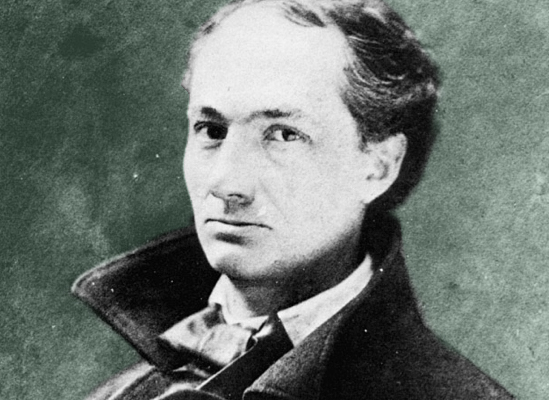
On November 6, we published a letter that a young Charles Baudelaire wrote to his mother from school, “just to let you know that everything has been perfect.” Seven months later, facing exams and the end of the year, seventeen-year-old Baudelaire had a more melancholy outlook. Here, he confides his worries about the future and renews his promise to work.
27 June 1838
My dear Mother,
I’m really longing to get a letter from you. It seems a very long time since I last received one. My days go by, one after the other, very sadly. I can feel the end of the year coming, and that frightens me, because of the competitive exam, in which, I’m afraid, I’ve really very little hope. I feel my life outside school approaching, and that causes me even more fear. All the people you have to get to know, all the effort you have to put in to find an empty place in the midst of the crowd, all that frightens me. But I’ve been put into this world to live and I’ll do my best. Then it seems to me that in this knowledge one has to acquire, in this struggle with others, even in this difficulty itself there must be a degree of pleasure.
We’ve had our exams in French discourse and in Latin discourse. We’re not going to do any more exams in Latin discourse except for the prizes. We still don’t know what places we’ve been given.
Mme. Jaquotot wrote to me asking about you, and wondering if I could spend a day with her. To avoid going out and to offer a perfect excuse, I claimed I’d been forbidden to leave school until the end of the year.
I do beg you to write to me, tell me what you see, and give me news of Father above all. You’ve doubtless now reached Barèges. I want to have news of you all the time and to follow his cure as if I were with you.
I’m always thinking of the vacations, less for the pleasures they bring than for the work I plan to do in them. I want to fill my days. And to tell the truth if I carried out all the things I’m promising myself that I’ll do, I really think I’d run out of time. I know very well what you say when I speak of such plans. But you also know how much courage I have and even how quickly I can do things when it’s absolutely necessary. Well, the necessity of living in the outside world is fast approaching, and who knows that I won’t suddenly change course for ever, as I suddenly change from time to time where my college work is concerned, and who knows that necessity won’t give me memory and energy?
Nevertheless something else frightens me, too. When I begin to think of the enormous number of benefits I owe you, I see that the only way to repay you is by satisfying your vanity, by my successes.
But my poor mother, if nature failed to make me capable of satisfying you, if I’m of too limited intelligence to please your ambitions, you’ll die before I’ve been able to repay you even to a small extent for all the trouble you’ve given yourself. I assure you I’m saying this in all good faith. For as far as a few college successes are concerned, I, who know how they are obtained, look on them as empty and insignificant, barely finding in them any proof of my intelligence. But I will work. Give Father a good hug for me, and tell me how he is. Tell me if I should put on each letter I send to you: “I request M. Coppenhague to send etc.” or whether I should simply send an envelope.
Hitherto I’ve just put the address to M. Coppenhague and asked him to send the letters on to Mme. Aupick, and as I didn’t indicate that these letters were from me, I’m afraid he hasn’t sent them on.
FURTHER READING
Find a detailed biography of Baudelaire from the Poetry Foundation here.
Read Delmore Schwartz’s take on Baudelaire’s relationship with his mother here.


